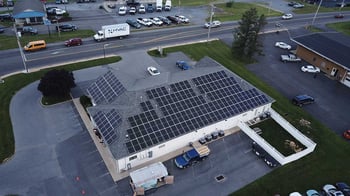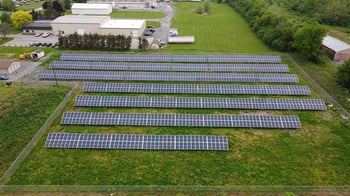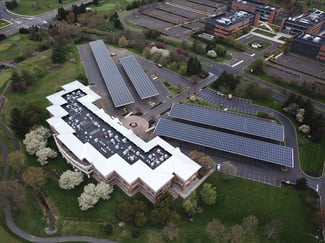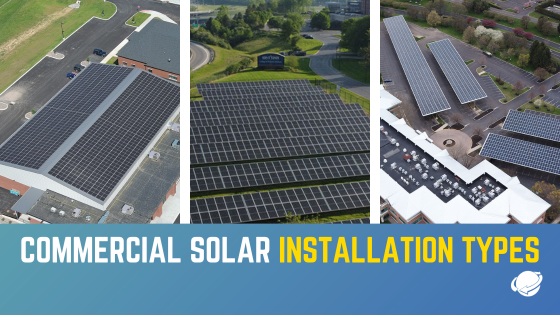Many businesses’ goals for going solar are the same: generate their own cost- and emissions-free electricity. However, three types of solar systems could achieve those goals: roof-top solar systems, ground-mounted solar systems, and solar canopies or carports.
Each type of commercial solar panel installation has benefits and drawbacks. We’re here to help you determine which is best for your business.
The Three Types of Commercial Solar Installations
Let’s dive into the three primary types of commercial solar panel installations: Roof Mounts, Ground Mounts, and Carports.
1. Commercial Roof Mounted Solar Installations
 Roof-top or roof-mounted solar systems are a popular choice for businesses. With this system type, solar panels are attached to a racking system which is installed directly on the roof of your building.
Roof-top or roof-mounted solar systems are a popular choice for businesses. With this system type, solar panels are attached to a racking system which is installed directly on the roof of your building.
The installation process and techniques will vary depending on the type of roof your business has, whether it is a metal roof, traditional asphalt shingles, or a flat rubber roof.
Solar Panels Can Be Mounted On Nearly Any Roof Type.
Shingle Roofs
Shingled roofs are one of the most common roof types, and solar attaches easily. Specially designed flashing and bolts secure panels and the racking system to the building’s rafters, preventing any leaking.
Standing Seam or Corrugated Metal Roofs
Panels and their racking system are mounted to custom clamps that sit securely over the corrugated portion of the roof. It is important to note that this type of installation does require roof penetrations. On the other hand, for installations on a standing seam roof, clamps are used to attach the panels without the need for any roof penetration.
Flat Roofs
Many flat-roof systems can be installed without roof penetrations. Solar panels are mounted to flat roofs as a ballast mount. This utilizes heavy blocks to weigh down the system.
The Pros and Cons of Commercial Roof Mounted Solar Panels.
Pros:
- Roof-top solar is typically the most affordable option
- It utilizes space that’s otherwise unused
- It can protect your roof from the elements and extend its life
- It’s out-of-the-way and hard to access/vandalize
Cons:
- The size of the system may be limited by the size of the roof
- Shading, tilt, or directional orientation may not be optimal, impacting production
- It requires a structurally sound roof that can handle the additional weight
- It may require roof penetrations, depending on your roof type
The Cost of Commercial Solar Roof
Roof-mounted systems are generally cheaper than other types of solar systems. This is because the structure on which the solar panels are mounted already exists — the roof itself. Other system types require the construction of structures on which to mount the panels, which increases cost.
An accurate price estimate will depend on several factors, such as the incentives you qualify for, the size of the system, and the type of equipment you install.
The average cost of a commercial roof-mounted solar system between 50 kW and 200 kW will be $145,000 to $500,000. After incentives, that could be between $70,000 and $224,000.
2. Commercial Solar Ground Mounts
Ground-mounted systems are those in which solar panels are installed on a free-standing structure built for that purpose. They’re typically located in a field or parcel of land that’s secured from unauthorized access.
Learn More: (VIDEO) The Ultimate Guide To Solar Ground Mounts
Commercial Ground Mount Pros and Cons
Pros:
- More freedom in design can lead to the optimization of energy production by avoiding shady areas and installing panels at the best tilt and directional orientation
- Never requires roof penetrations, and you don’t need to worry about the added weight of the panels on your roof
- Can be easily accessed for maintenance
- Your system’s size isn’t constrained by the size of your roof
- Won’t impact the curb appeal of your building
Cons:
- Typically costs more than a similarly sized roof mount
- Limits the use of the land it’s installed on
- Easier access for unauthorized visitors
- It may require security fencing
- You will have to mow around posts and under low clearances
The Cost of Commercial Solar Ground Mounts
 Ground mounts require an additional element to the solar system – the mounting structure, which oftentimes increases the overall installation cost. You’ll have to pay for the materials and labor needed to create this metal frame with posts pounded or cemented into the ground. That said, ground mounts are typically less expensive than solar canopies and carports because they’re smaller, simpler structures that are closer to the ground.
Ground mounts require an additional element to the solar system – the mounting structure, which oftentimes increases the overall installation cost. You’ll have to pay for the materials and labor needed to create this metal frame with posts pounded or cemented into the ground. That said, ground mounts are typically less expensive than solar canopies and carports because they’re smaller, simpler structures that are closer to the ground.
Is the additional cost for ground-mounted solar panels worth it? In some cases, yes. Ground mounts can be slightly more efficient since you’ll be able to install the panels in a way that maximizes their sun exposure from tilt angle to directional orientation. However, if you have a roof that works for solar, that is typically going to be the more cost-effective solution.
The cost of a ground-mount commercial solar system between 50kW – 200kW in size could be around $152,500 – $500,000. After incentives, that could be around $75,000 – $251,000. That’s roughly a 7% – 12% increase in price over a roof mount.
3. Commercial Solar Canopies and Carports
 Solar carports and canopies are typically the most expensive type of commercial solar system. Similar to ground-mounted systems, they require the construction of structures on which the solar panels will be mounted. However, these structures need to be even taller. The clearance height and size of the system will have a significant impact on the cost.
Solar carports and canopies are typically the most expensive type of commercial solar system. Similar to ground-mounted systems, they require the construction of structures on which the solar panels will be mounted. However, these structures need to be even taller. The clearance height and size of the system will have a significant impact on the cost.
Additionally, all-but-necessary features like gutters to control rain runoff, snow guards, and lighting underneath the canopies will add to the cost.
It’s difficult to give a price range for solar canopies because they are unique solutions to each business. System size, vehicle clearance, and the equipment installed will have a significant impact on how much the system costs.
Commercial Carport Pros and Cons
Pros:
- Can be installed in areas with little shade at the proper tilt and orientation for optimum production
- Offer protection from the elements for vehicles and other equipment.
- Use space that typically can’t be used for other purposes
- Offer a level of customization for the height, overall size, and type of structure
- Highly visible for your customers and employees
Cons:
- Higher installation cost
- Need a water run-off plan
- Need additional equipment (lights, rain gutters, etc.) not needed with other types of installations
- More complex installation process
What’s the Best Type of Installation For Your Business?
The best type of commercial solar installation will vary based on your business and its goals. Explore your options together with our local solar consultants. They can visit your facility and answer all your questions to your business determine which type of installation will best accomplish your goals.
Not ready for your free consultation? Download our commercial solar buyers guide.





















